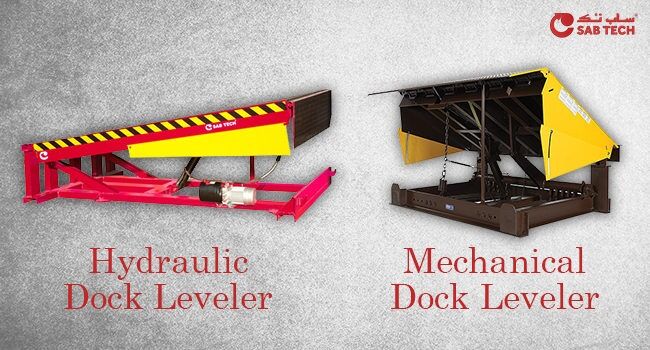Key Differences Between Mechanical and Hydraulic Dock Levelers

Different types of dock levelers are available according to the requirement and space availability, such as Hydraulic Dock Leveler, Mechanical Dock Leveler, Loading Bridge, Mini Dock Leveler, etc. All dock levelers serve almost the same purpose of loading and unloading with ease and fastest way.
Mechanical Dock Leveler
Mechanical dock leveler consists of Spring System at the rear, which lifts dock leveler by pulling a chain and person walks onto the leveler to lower down leveler to bring to trailer bed height with his weight and fix latches to hold with trailer. If the trailer/vehicle height is lower than dock leveler height, then the operator has to pull the other chain at the front of the dock leveler to retract support to bring dock to trailer/vehicle bed height. Also, many different moving parts may require frequent maintenance or replacement due to heavy loading/unloading with the time of usage. It is because most of the moving parts are under immense pressure always, particularly spring, and it costs more and more breakdown time. Dock leveler’s springs are heat/cold sensitive, expanding in summer and contracting in winter require adjustment in every season for better result.
Hydraulic Dock Leveler
Hydraulic dock leveler consists of a hydraulic power pack, hydraulic cylinders, electric panel, and hydraulic power pack. With one push, leveler can adjust and align with trailer bed height, and after loading and unloading, one push brings leveler to its original position. A hydraulic dock leveler is easy to operate, and it has lesser moving parts, which increases its working life, and also less maintenance is required. It also saves cost and breakdown time. Hydraulic dock levelers are efficient and more manageable for workers as there is no bending and chain pulling, fixing latches, removing latches at the end of loading/unloading, and lowers the chance of injury.
Upfront Cost
Mechanical dock levelers are affordable by all, as these are 15 to 20% cheaper than hydraulic dock levelers. Still, the upfront cost does not account for long terms as it requires more time to adjust with the trailer’s height, parts replacement and service fee, and more breakout time. Warehouse in charge has to conduct analysis to determine if upfront saving is worth for selecting manual dock lever with comparing to long term upfront costs for selecting hydraulic dock levelers.
Repair and Maintenance Cost
Mechanical dock levelers have more moving parts that need repair and/or replacement throughout the year with usage. It also requires spare parts that are frequently damaged to be kept in a warehouse for urgency repair.
But on the other side Hydraulic dock levelers having fewer parts like power pack and cylinders, which are durable and have long working life, repair and maintenance cost is lesser than mechanical dock leveler and also lower breakdown time. Adequate preventive maintenance enhances the life span of the hydraulic leveler and lessens breakdown time, which results in more performance.
Capacities and Usage
Mechanical dock levelers are suitable for the facilities where less usage of loading and loading in a whole day, also where load capacity is less, including forklift load.
Hydraulic dock levelers are suitable for higher capacity loads such as steel, liquid, paper rolls as these heavier and bulkier loads. They are also ideal for facilities where usage is frequent in a whole day of loading and unloading, with higher load capacities—up to 10 tons or more, including forklift weight.
Summary
To select a suitable dock leveler, the facility manager has to conduct a feasibility study of his requirement considering the following aspects:
- Proper length, width & capacity
- Frequency of usage per day
- Breakdown time
- Convenience to operate such as activate & leveler positioning
- Full range leveler float and lip extension/retraction,
- Maintenance frequency, feature for easy maintenance
- Initial & lifetime cost
Also, the facility manager has to consider safety measures like vacant drop-off protection, cross-traffic safety, free fall protection & maintenance safety, manufacturer support in terms of repair & maintenance, training, and warranties.
Several studies show that Hydraulic dock leveler is more convenient to use, suitable for heavy loads, durable, less maintenance cost, and breakdown time for frequent usage.
But, Mechanical dock leveler is spring powered, requires manual activation to adjust platform with trailer’s height by pulling chain (located rear and front of leveler), suitable for less frequent usage in a whole day, and less weight of loading and unloading including forklift weight. It requires more maintenance to avoid breakdown time. Although it saves upfront cost, but on the other hand, its performance is lesser than the hydraulic dock leveler. While selecting mechanical dock leveler, the facility in-charge must have to conduct formal feasibility report considering, convenient to use, the safety of the worker, repair and maintenance support from the supplier, availability of spare parts, and less breakdown time. The most crucial aspect to monitor is that the operator has to use it according to specified weight to avoid any accident.
If you are looking for a good quality Hydraulic Dock Leveler, SABTECH can provide one that is customized according to your exact requirements. Our Hydraulic Dock Levelers are available in capacities of up to 45 tons. To know more, please visit – https://sabtech.com.sa/product/dock-leveler/